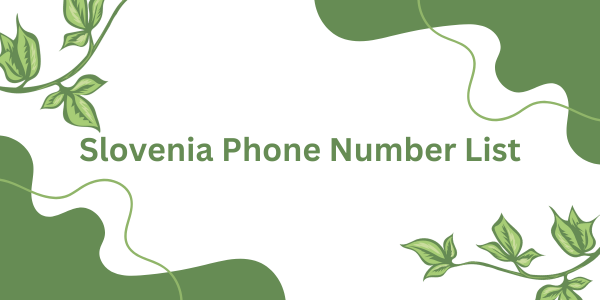|
|
The national language of Slovenia is Slovene, also referred to as Slovak or Slovenski jezik in the Slovenian language. It is the official and primary language spoken by the people of Slovenia and serves as a vital part of the country’s national identity and cultural heritage.
Language Overview
Slovene is a Slavic language and belongs to the Indo-European Slovenia Phone Number List language family, specifically the South Slavic branch. It is closely related to other South Slavic languages, such as Croatian, Serbian, and Bosnian, though it has distinct differences in vocabulary, pronunciation, and grammar.
Slovene is a phonetic language, meaning that its words are pronounced as they are written. This makes learning pronunciation easier, but like many Slavic languages, it has a complex grammatical structure.

Number of Speakers
Slovene is spoken by approximately 2.1 million people worldwide, with the vast majority of speakers residing in Slovenia. While Slovene is the dominant and national language, regional dialects are spoken throughout the country, reflecting Slovenia’s diverse regional identities. These dialects vary based on geographic regions but are generally mutually intelligible.
Besides Slovenia, Slovene-speaking communities are present in neighboring countries such as Italy, Austria, Hungary, and Croatia, particularly in regions historically linked to Slovenian migration or settlement patterns.
Language Status
Slovene was declared the official language of Slovenia upon USA Phone number Database the country’s independence in 1991. As the sole official language, it is used in all governmental, legal, and educational institutions, as well as media and public communication.
While Slovene is the national and official language, many Slovenes are bilingual or multilingual due to the country’s geographical location and history. English, German, and Italian are widely spoken, particularly in urban centers and among younger generations.
Cultural Significance
Slovene is more than just a means of communication; it is a core component of Slovenia’s national identity. The language reflects the country's long history, combining influences from its neighboring Slavic, Germanic, and Romance-speaking regions.
Cultural figures like France Prešeren, Slovenia’s national poet, have used the Slovene language to preserve and promote national traditions and stories. Moreover, language preservation efforts emphasize the importance of Slovene as a unifying element for Slovenian heritage.
Conclusion
The national language of Slovenia, Slovene, is not only a tool for communication but also a symbol of Slovenia’s cultural and national identity. It connects the diverse regions of the country, celebrates its historical legacy, and fosters unity among its citizens. As Slovenia continues to develop and interact with the European and global community, Slovene remains a vital part of its identity and daily life.
|
|